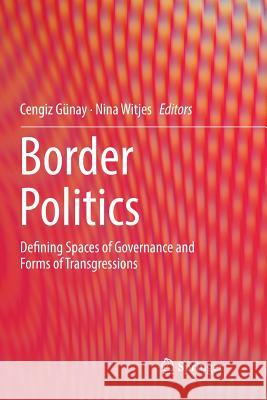Border Politics: Defining Spaces of Governance and Forms of Transgressions » książka
topmenu
Border Politics: Defining Spaces of Governance and Forms of Transgressions
ISBN-13: 9783319836027 / Angielski / Miękka / 2018 / 212 str.
Kategorie BISAC:
Wydawca:
Springer
Język:
Angielski
ISBN-13:
9783319836027
Rok wydania:
2018
Wydanie:
Softcover Repri
Ilość stron:
212
Waga:
0.32 kg
Wymiary:
23.39 x 15.6 x 1.22
Oprawa:
Miękka
Wolumenów:
01
Dodatkowe informacje:
Wydanie ilustrowane











